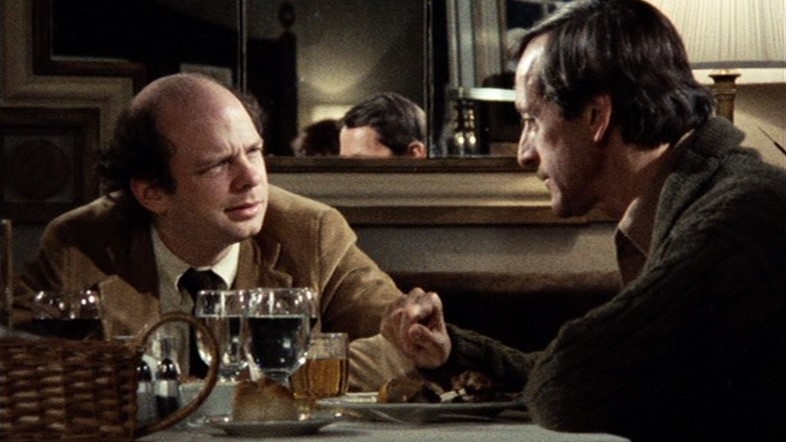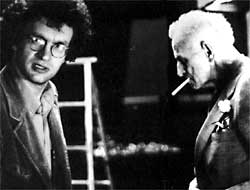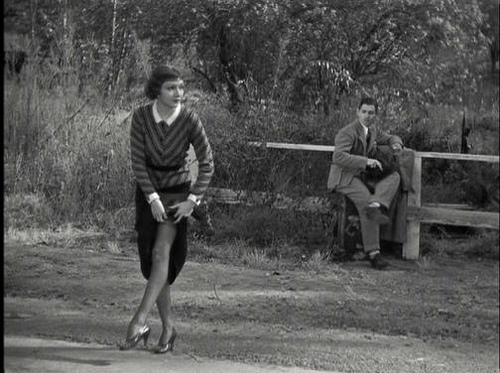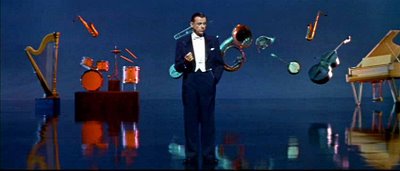From the Chicago Reader (August 2, 1996). — J.R.

Trainspotting
Rating *** A must see
Directed by Danny Boyle
Written by John Hodge
With Ewan McGregor, Ewen Bremner, Jonny Lee Miller, Kevin McKidd, Robert Carlyle, Kelly Macdonald, and Susan Vidler.

It would be pushing it to call Trainspotting a serious work of art or a major statement about anything, but as an edgy, artful piece of entertainment it beats any Hollywood release of the summer by miles. That isn’t much of a compliment. The awfulness of the current crop of “big” (i.e., extensively advertised) summer movies has been so unprecedented that when people ask me how I could find anything halfway nice to say about The Rock and Independence Day, I can only refer them to the even worse dreck they were fortunate enough to miss. Context changes everything: at Cannes, where I first saw Trainspotting, there were at least nine other movies I liked more, and perhaps another seven or eight I liked as much. But in the context of commercial movies this summer, the film unquestionably shines.
Adapted from a 1993 novel by Irvine Welsh, who has a cameo in the movie as a drug dealer, Trainspotting was created by the same team that turned out the much less interesting Shallow Grave: producer Andrew Macdonald, director Danny Boyle, writer John Hodge, lead actor Ewan McGregor, and the same cinematographer, production designer, and editor. Read more
From The Soho News (October 27, 1981). — J.R.


It’s no surprise that My Dinner with André (loved by Vincent Canby), now on at the Lincoln Plaza, was one of the most popular films at the New York Film Festival — or that Lightning Over Water (hated by Canby), and now on at the Public, was one of the least popular. It isn’t just that the former movie says something that many of us want to hear, and says it well — nor that the latter says something that few of us want to hear, and says it problematically.
Each movie stars two artists who work in the world of make-believe, playing themselves, and yet the respective positions each pair takes in relation to playing this game couldn’t be more different. For André, director Louis Malle worked from a script by the two performers, playwright/actor Wallace Shawn and stage director André Gregory. For Lightning, film directors Wim Wenders and the dying Nicholas Ray almost concurrently wrote and directed their own performances, after a fashion.
Having once played myself in a film (Peter Bull’s The Two-Backed Beast, or The Critic Makes the Film), at the same time that I was writing a critical memoir that allowed me to play myself in a book (Moving Places: A Life at the Movies), I can well appreciate the subjective factors that enter into any exercise in self- representation. Read more
The following was commissioned by and published in Frank Tashlin, edited by Roger Garcia and Bernard Eisenschitz, Éditions du festival international du film de Locarno, 1994. — J.R.



“According to Georges Sadoul, Frank Tashlin is a second-rank director because he has never done a remake of You Can’t Take It With You or The Awful Truth. According to me, my colleague errs in mistaking a closed door for an open one. In fifteen years’ time, people will realize that The Girl Can’t Help It served then — that is, today — as a fountain of youth from which the cinema now — that is, in the future — has drawn fresh inspiration ….To sum up, Frank Tashlin has not renovated the Hollywood comedy. He has done better. There is not a difference in degree between Hollywood or Bust and It Happened One Night, between The Girl Can’t Help It and Design For Living, but a difference in kind. Tashlin, in other words, has not renewed but created. And henceforth, when you talk about a comedy, don’t say ‘It’s Chaplinesque’; say, loud and clear, ‘‘It’s Tashlinesque’.“

Jean-Luc Godard’s review of Hollywood or Bust in the 73rd issue of Cahiers du cinéma (July 1957) is founded on a frank prophecy, only a small part of which has come true. Read more








